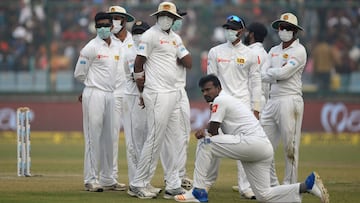Delhi’s viability as an international cricket venue called into question due to smog
Scenes of cricketers wearing masks and vomiting on field have reignited the debate about hosting major sports events in Delhi.

For several weeks, Delhi has suffered from smog pollution, affecting cricketers during the Sri Lanka tour of India.
On Tuesday, at the stage of the fourth day of the third Test at the Feroz Shah Kotla stadium, India’s Mohammad Shami and Sri Lanka’s Suranga Lakmal vomited on the field.
During the match, which India won by 378 runs, Sri Lankan players had to wear masks to protect themselves from Delhi’s heavy air pollution.
On Sunday, the third day of the Test, the game was also halted for around 20 minutes as Sri Lankan fielders complained of health troubles.
India’s Cricket Board accused the visitors of exaggerating the issue, but doctors have been increasingly vocal about the health risks of playing sports in such a polluted environment.
Athletes at serious risk
On a scale of 0-500, the Air Quality Index (AQI) dropped to 379 from Monday’s average of 390 on Tuesday.
An AQI average above 300 is considered hazardous and is very likely to affect the entire population.
A good AQI stands at between 0 and 50, far away from the levels experienced in Delhi.
Due to increased breathing, those that do sports in a polluted environment are exposed to air pollution levels three times higher than those resting.
Delhi’s government has been widely criticised over measures taken to combat pollution, and for allowing the cricket Test between India and Sri Lanka to go ahead.
Condemning the Test, KK Aggarwal, the president of the Indian Medical Association, was quoted by reports as saying: “This match should not have taken place in the first place. It is time the ICC comes up with a policy on pollution.
“You have fast bowlers, batsmen and fielders out there exposed to these very harmful pollutants over five days at a stretch. It takes a serious toll on your health in the long run.”
According to the BBC, India’s Cricket Board says it will take smog into consideration when scheduling matches in Delhi in the future.
Pollution and denial
Generally, pollution levels rise during the winter across northern India and Pakistan due to crop burning in the region and cool air trapping particulates close to the ground.
With pollution levels particularly alarming in the past two years, doctors have raised awareness against sports events in Delhi.
Last month, days after schools were closed amid a public health emergency, around 35,000 runners participated in the city's half marathon.
Several athletes complained of side effects.
Related stories
“My eyes are burning; my throat is dry. I have a running nose,” running enthusiast Rohit Mohan told The Guardian. “It’s been terrible since I landed here yesterday.”
According to the Hindustan Times, doctors launched a legal challenge in an unsuccessful attempt to prevent the race from going ahead.